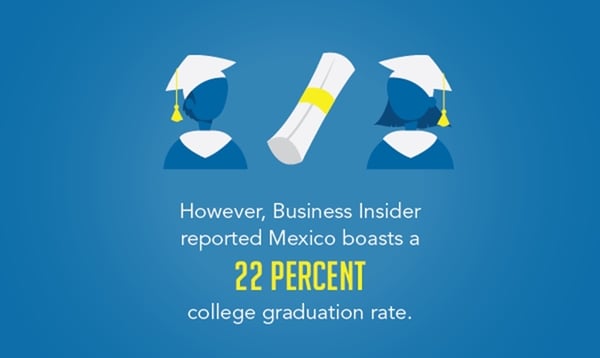The low cost of labor, which formerly drove businesses to move their operations to China, is now considered one of the key benefits of manufacturing in Mexico. In fact, Business Insider cited a study by the Boston Consulting Group that showed average manufacturing labor costs in Mexico are projected to be 19 percent lower than in China, while in 2000, Mexican labor was 58 percent more expensive than in China.
The discrepancy is even larger when examining the major shift that has occurred in the manufacturing sector in the U.S. According to The Seattle Times, Mexico has experienced a 40 percent increase in auto jobs since 2008, compared to the U.S., where manufacturing jobs in the same industry only increase 15 percent during the same time period. High labor costs in the U.S., which can reach $60 an hour, are certainly a factor worth considering in this shift.
Opponents of offshoring often insist that businesses move their manufacturing operations to countries outside of the U.S., China, Canada and elsewhere solely due to the advantage of low labor costs. However, the benefits of manufacturing in Mexico stretch far beyond labor costs alone.
 The offshoring advantages of manufacturing in Mexico are vast.
The offshoring advantages of manufacturing in Mexico are vast.Quality over cost
An easy argument to make is that the trade-off for "cheap" labor in Mexico is low-quality work. This logic is flawed and incorrect, though. In the past, it was certainly true that businesses either stayed within the borders of the U.S. or tapped into China's workforce for the opportunity to gain access to highly skilled labor. However, Business Insider reported Mexico boasts a 22 percent college graduation rate. Beyond that, the Mexican government has invested heavily in education surrounding engineering, so manufacturers across industries are much more confident in the quality of the country's workforce.
Mexico has also doubled its number of public two-year colleges and four-year universities, Area Development reported. Additionally, the government has financed 140 new colleges and universities, the majority of which emphasize science and engineering. As a result, Mexican students are earning more engineering degrees each year than both Canadians and Germans.
Those who are hesitant about the quality of labor coming from Mexico can look no further than Bill Hammond of Hammond Power, a Canadian company that builds electrical transformers. Hammond believes Mexico has taken great stride to correct the labor quality problem that used to exist in the country, CBCNews reported.
"There was a time when Mexico had a reputation of building shoddy product," Hammond said. "We're finding now that global manufacturers are more than willing to accept products coming out of Mexico because the quality levels are as good as they are out of the United States or Canada."
Labor and beyond
However, the benefits of manufacturing in Mexico reach far beyond labor costs or quality. While businesses in Mexico are able to conduct their operations cost-effectively while simultaneously tapping into a highly skilled workforce and stimulating the growth of Mexico's middle class, there are other offshoring advantages worth appreciating:
"The benefits of manufacturing in Mexico reach far beyond labor costs or quality."
- Supply chain efficiencies: One of the main reasons many companies are moving all or part of their operations to Mexico is to be closer to high-end markets like the U.S. and Canada, and enjoy greater proximity to OEMs. This has not only impacted the U.S. China has also seen a decline in its manufacturing sector due to supply chain efficiencies that come with manufacturing in Mexico. In fact, Supply & Demand Chain Executive pointed pointed out the growing trend of auto manufacturers moving part of their production from Asia to North America in response to increased production costs and growing complexity and risk of supply chains from Asia to the U.S
- Trade: Mexico's participation in NAFTA and 44 free-trade agreements are tremendous draws to manufacturers expanding to Mexico. As a result of trade liberalization in the country, manufacturers can import and export fully assembled goods or supplies at a much lower cost than they can in the U.S.
- Infrastructure: In response to the growth of manufacturing in the country, Mexico has taken great strides to improve infrastructure and create a better environment for businesses operating in the country. For example, Bloomberg Business reported Comision Federal de Electricidad, Mexico's state-owned power company, expects to spend $16.6 billion on infrastructure including pipelines and power projects.
- Maquiladoras: The existence of maquiladoras is a unique benefit of manufacturing in Mexico. A maquiladora is a legal entity in the country that the Mexican government identifies as a factory run by a foreign country that exports its goods to its country of origin. The opportunity to qualify for this status means manufacturers in the country have access to certain tax and trade benefits.
The low cost of labor is no doubt a major motivator for companies to move to Mexico. However, the cost of labor doesn't mean much if the quality, infrastructure and economic opportunities are not there. Mexico offers a variety of offshoring advantages manufacturers can tap into, and this is why the country has experienced such rapid growth in the sector.
Subscribe
Sign up and stay informed with tips, updates, and best practices for manufacturing in Mexico.






